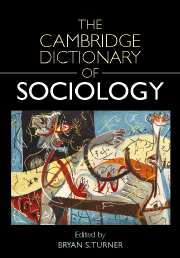B
Published online by Cambridge University Press: 22 October 2021
Summary
Bales, Robert Freed (1916–2004)
An important figure in the growth of the study of group dynamics, Bales received his PhD from Harvard University, becoming Harvard Professor of Social Relations (1945–86). He spent the entirety of his academic career at that institution.
During the 1950s and 1960s when the study of small groups was at its height, Bales was a major figure in exploring the dynamics of group life. His 1950 book, Interaction Process Analysis: A Method for the Study of Small Groups, is considered a classic work, particularly in its development of a twelvecategory coding scheme for direct observation and coding of verbal statements and nonverbal acts in both natural and laboratory groups. This method permitted social psychologists to explore systematically behavior in collective settings.
Bales was a close associate of the Harvard social theorist Talcott Parsons, and was one of the contributors to Parsons's project for the development of a general theory of social action. Consistent with the interests of many of his Harvard colleagues, Bales maintained a lively involvement in psychoanalysis, a theory that affected both his research and his teaching.
Later in Bales's career, he extended the model of interaction process analysis into a threedimensional coding system, eventually termed SYMLOG (SYstem for the Multiple Level Observation of Groups). Towards the end of his career, Bales became more involved in consulting, applying his models of group life to social problems, and eventually created a consulting group for his SYMLOG system.
Bales may have been particularly well known for the self-analytic group course that he ran at Harvard for over a quarter-century, which became a model for similar courses throughout the United States. In these courses, students were trained to analyze their own group communication, while simultaneously learning theories of group dynamics. These groups also served as a training tool for graduate students under Bales's direction.
Barthes, Roland (1915–1980)
Widely hailed as one of the most important French intellectuals of the postwar years, Roland Barthes's semiological approach to the study of society sought to demonstrate how cultural production reproduces itself through the signs it creates (see cultural reproduction).
- Type
- Chapter
- Information
- The Cambridge Dictionary of Sociology , pp. 31 - 48Publisher: Cambridge University PressPrint publication year: 2006



